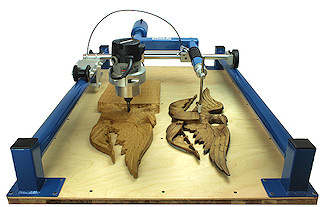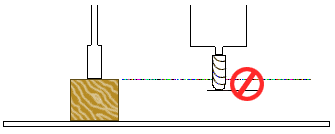|
A duplication machine is a significant investment for your business. We understand this and want to be
certain you make the right decision for the work you do. To this end we have created this overview of
duplicator qualities so that you can be an informed consumer.
RIGIDITY = ACCURACY
To get the most accurate copy out of a duplicator, its structure and all of its
components must be as rigid as possible. A rigid duplicator will take a
heavier cut with accuracy giving you a cleaner copy in less time. Since you
are probably buying a duplicator to cut production time we consider this the key quality
of a machine.

Checklist for rigidity:
 Carriage rails of 2" thick walled tubing for minimum flexing Carriage rails of 2" thick walled tubing for minimum flexing
 A simple design with few components and joints A simple design with few components and joints
 A steel structure that resists twisting and deflection A steel structure that resists twisting and deflection
 High-quality, steel ball bearings for precise movement High-quality, steel ball bearings for precise movement
A cheaper carver will not meet these standards. A flexible machine requires excessive time and care to
produce an acceptable carving. A rigid carver will take fewer passes as the cutting head
can bite down hard without deflecting from the path of the follower.
Be wary of under-designed Duplicators.
Here are some signs:
- Cutter set back from follower -
Users are often forced to set the cutter back from the tracer to cut
oversize to prevent gouging errors. This results in a low-fidelity
reproduction that requires much more post-duplication finish work to
bring up to spec.
- Up-spiral cutter -
Sometimes used in an attempt to reduce gouging if the structure is not
rigid enough to resist the digging of the cutter.
- Aluminum structure -
A lightweight aluminum structure will twist under load. A serious tool
has to be heavy if it is to be rigid enough for serious work.
- Small diameter rails -
The structure, which you rely on to keep the follower and cutter true to
each other will twist and deform, leading to poor reproduction.
- Too many parts -
Excessive hinges, pins, bolts, and adjustments, each of which add
additional play and error.

- Fails the deflection test -
Place a one inch cube of wood under the follower and press down on the
router. The router should not deflect downward.
SIMPLICITY = SPEED
To make up for construction deficiencies, some carver makers will
shorten the carriage rails to reduce the impact the flexing of these
parts has on accuracy. The resulting undersized carving area requires
multiple adjustments and re-setups to copy a piece. Our patented
"H" design lets you carve in a 1280 cubic inch volume for the 9" model
and a whopping 3670 cubic inch volume for our 18" model--with no re-setups.
|